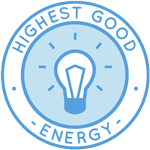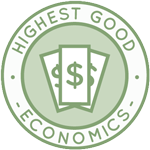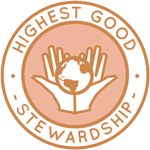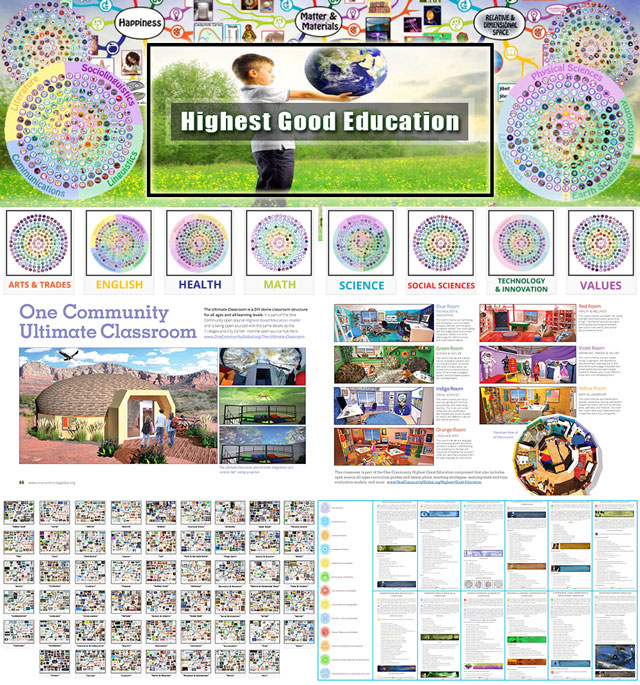Building a Bridge Between Idealism and Pragmatism – One Community Weekly Progress Update #413
How do we go about building a bridge between idealism and pragmatism? One Community thinks we can best achieve this by demonstrating a more enriching and luxurious life that is also good for the planet and other people. Based on sustainable infrastructure that is healthier and lowers living expenses, and cooperative living that provides more free time and things to do with that free time, we can build a better life for ourselves while helping everyone else too.
- Here’s our project overview
- Here’s our world-change methodology
- Here’s how this becomes self-replicating
- Here’s how we are open source and free-sharing all the do-it-yourself designs

OUR MAIN OPEN SOURCE HUBS
Click on each icon to be taken to the corresponding Highest Good hub page.
One Community’s physical location will forward this movement as the first of many self-replicating teacher/demonstration communities, villages, and cities to be built around the world. This is the February 21st, 2021 edition (#413) of our weekly progress update detailing our team’s development and accomplishments:
Building a Bridge Between Idealism and Pragmatism
One Community Progress Update #413
DONATE | COLLABORATE | HELP WITH LARGE-SCALE FUNDING
CLICK HERE IF YOU’D LIKE TO RECEIVE AN EMAIL EACH WEEK WHEN WE RELEASE A NEW UPDATE
YOU CAN ALSO JOIN US THROUGH SOCIAL MEDIA
ONE COMMUNITY WEEKLY UPDATE DETAILS
HIGHEST GOOD HOUSING PROGRESS – BUILDING A BRIDGE BETWEEN IDEALISM AND PRAGMATISM
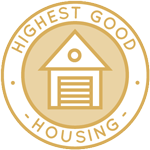 One Community is building a bridge between idealism and pragmatism through Highest Good housing that is artistic and beautiful, more affordable, more space efficient, lasts longer, DIY buildable, and constructed with healthy and sustainable materials:
One Community is building a bridge between idealism and pragmatism through Highest Good housing that is artistic and beautiful, more affordable, more space efficient, lasts longer, DIY buildable, and constructed with healthy and sustainable materials:
- Learn about: Our Upcoming Crowdfunding Campaign
- Learn about the different village models: 7 Sustainable Village Models
- Visit the open source portals for the first two: Earthbag Village OS Hub | Straw Bale Village OS Hub
This week the core team continued the editing and creation process of the Earthbag Village “Earth-Dome Loft Structural Engineering and Calculations” page. This week we modified the tables for aesthetics and easier understanding. We also corrected some aspects of the “Ethical, Humane, & Conscientious Rabbit Stewardship” tutorial too.
Dean Scholz (Architectural Designer) continued helping with the Earthbag Village (Pod 1) 4-dome cluster designs. This week was week #214 of Dean’s work and the focus was creating and testing the table and beanbag textures.
Jose Luis Flores (Mechanical Engineer) completed his 30th week helping finish the Net-zero Bathroom component of the Earthbag Village. This week Jose Luis continued developing a solution to seal the hole on the roof of the Net-Zero Bathroom. The seal was to keep the rain storage room insulated by sealing off the water collection hole in the roof while not disrupting the inflow of rainwater.
Last week’s design had the right idea in packaging, but the material used was not durable and would lead to installation difficulties. He collaborated with his supervisor and determined that an aircrete mold would be optimal. The first idea was to make two identical aircrete molds that would sit on top of the top center water barrel and connect to the roof hole, the rainwater would be able to flow into the barrel.
By making two molds, one half could be removed and leave access to the debris filter on top of the barrel. The two molds were to be held in place with wing screw and a wing nut fastened through eye screws attached to the molds. Measurements and calculations were done to determine the maximum height of the mold due the constraints from the interior roof frame. The max height was determined to be 10.76 inches, well short of the 15.5 inches needed.
The final adjustment was to make the two molds only 7.3 inches tall the same as the distance from the interior roof frame to the barrel. And on top of that first mold would be another complete mold being bound to the roof frame by aircrete. The half mold was calculated to be less than 15 pounds, light enough for a person to lift it without being injured. The pictures below show some of this work.
Stacey Maillet (Graphic Designer) completed her 28th week working on the final edits and revisions to the Murphy bed instructions. This week was focused on rebuilding the components pages and reworking the groups with new feedback for labelling used pieces in grey patterned lines after use. We also received updated renders for the electrical work and tried to use those instead of the older renders. There is still some overlap between the electrical instructions and the wall section where outlet installation and placement is called out in both groups.
The additional electrical outlets that are not installed into the Murphy bed, but into the structure’s walls and loft space, which has led to some confusion. The Murphy bed is so integrated into the structure of the dome that it is hard to know how to keep these instructions limited to the bed without explaining some portion of the loft space, walls and doorway. Screenshots below are related to this latest progress.
Mark Wambua (Civil Engineer) completed his 6th week working on the Parking Lot and Sustainable Roadways, Walkways, and Landscaping guides. This week Mark mainly focused on completing the temporary parking lot tutorial, so it could be reviewed and added to the website. A first draft was finished and he also began work on the water catchment tutorial. Pictures below show some of this work-in-progress.
Zhiheng “Samson” Su (Civil Engineer) also completed his 6th week on the team and woking on the Parking Lot and Sustainable Roadways, Walkways, and Landscaping guides. This week Samson finished the research of both “Rigid Pavement Design” and “Flexible Pavement Design” and began research about Turf Block, Porous Asphalt, and Decomposed Granite Paving. He added links to articles about these three materials to the Google Doc and began writing the introduction and the construction detail about porous asphalt. See pictures below.
Vicente J Subiela (Project Management Adviser) completed his 5th week working on the solar microgrid design, sizing, and cost analysis specifics. This week, Vicente checked the energy needs distribution for the cases of 20-50 and 50-100 people for an initial perspective on the thermal weight on the total demand / installed power, concluding that, according to the current estimation, heating demands more than 75% of energy (case of 20-50 p).
He has improved the SAM simulations to a first view of the energy & economic balance and started a text describing the topic to achieve the net zero balance along the year. He has incorporated new relevant consulting links (a list of incentives applicable to the location). He also updated the tasks for the collaboration team, for faster incorporation into the ongoing work. Pictures below show some of this work.

Building a Bridge Between Idealism and Pragmatism – Solar Micro-grid – Cost Analysis ” Click for Page
Aidan Geissler (Sustainability Researcher) completed his 2nd week helping with 2nd-to-final review, feedback, and content editing. Aidan finished reviewing the Most Sustainable Flooring Materials webpage. He added titles to links, ensured that links functioned properly, added useful anchor links, defined technical terminology, located and added relevant resources, and conducted research to provide additional contextual information and content to fill in gaps.
Aidan then reviewed the current Health Insurance content, where he provided useful comments and suggestions to guide the development of the research and analysis. Finally, Aidan began editing the Styrofoam Recycling Webpage, by correcting typos, fixing missing and broken links, and rephrasing for the sake of clarity and ease of reading. Pictures below show some of the work on these three components.
DUPLICABLE CITY CENTER PROGRESS – BUILDING A BRIDGE BETWEEN IDEALISM AND PRAGMATISM
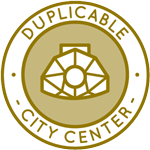 One Community is building a bridge between idealism and pragmatism through a Duplicable and Sustainable City Center that is LEED Platinum certified/Sustainable, can feed 200 people at a time, provide laundry for over 300 people, is beautiful, spacious, and saves resources, money, and space:
One Community is building a bridge between idealism and pragmatism through a Duplicable and Sustainable City Center that is LEED Platinum certified/Sustainable, can feed 200 people at a time, provide laundry for over 300 people, is beautiful, spacious, and saves resources, money, and space:
- Learn about this building and it’s function: Duplicable City Center Open Source Hub
This week the core team finalized One Community’s plan for wind energy on the Wind Microgrid page. You can see the new content below.
This week Ksenia Akimov (Plumbing Engineer) completed her 21st week working on the Duplicable City Center plumbing designs. This week she focused on trying to find codes for water and sewer pipes in food storage rooms. It doesn’t look like this is allowed, so she’s exploring more and trying to come up with alternatives. Pictures below are related to this work.
Qiuheng Xu (Landscape Designer) completed her 20th week helping with the Duplicable City Center, now focused solely on the landscaping design. This week, Qiuheng focused on redoing the structure model in Lumion as well as updating the new planting design. She changed the greenhouse into a simpler and smaller version. In addition, she modified the path system in the landscape to meet the doors of the domes. Qiuheng also began preparing the first draft of the outside walkthrough video. Pictures below show some of this work-in-progress.
Haozhen “Andrew” He (Civil Design Engineer) completed his 7th week as a member of the team helping with the City Center Water Catchment Designs. This week, Haozhen did the research on the usability of the roof hangers in the absence of the fascia board. He then designed and drafted the “Roof Hanger” from scratch via AutoCAD 3D. He made sure that the scaling and detail are correct and the final result matches the size of the gutter and functions correctly. Haozhen also worked with David on the subject of designing an optimum downspout for the zone D-3. David’s first proposal was using the Rainbird, polyethylene tube.
However, by our research, polypropylene is susceptible to quick degradation by sunlight while polyester innately resists deterioration. Polypropylene is useful for applications that require high heat, chemical, or electrical stresses, but polyester is more suitable for outdoor uses and environmental exposure. Haozhen also designed the Downspout elbow connection with model detail, worked on designing the connection between gutter and the downspout using AutoCAD 3D, and worked on fixing the downspout and gutter connection detail. Pictures of some of this work are below.
David Na (Project Management Adviser/Engineer) completed his 2nd week helping with input and management of the Parking Lot and Sustainable Roadways, Walkways, and Landscaping tutorial development, as well as the City Center Water Catchment Designs. This week David worked with Mark to complete the temporary parking lot tutorial for a final review. In the tutorial David and Mark go into detail to discuss everything from the necessary permits needed to be obtained to the different types of temporary parking lot design options.
They conclude the tutorial with a comparative analysis for each design option and explain why One Community Global believes that TrueGrid’s paver design was best suited for the project. David has also worked with Andrew to brainstorm possible solutions for the City Center’s Sunrise patio drainage problem. After looking into the CAD design and the 3D renderings for the building, David has proposed installing area drains on the sunrise patio that would collect and discharge the flow onto the second floor which would then be collected and discharged to ground level via downspout.
However, this solution is not the best solution because it brings the water into the building and would therefore lead to potential leak problems, noise pollution, and other types of inconveniences. With this in mind, David and Andrew are both working on researching an alternative solution which will utilize a flexible drainage pipe with a sock or pipe guard to protect against UV damage. Lastly, David worked on setting up the introductory sections for the sustainable roadways, walkways, and landscaping. Pictures below are related to this work.
Long-term collaborator Bahy Ahmed (Architect) also continued with his 2nd week modeling the specifics for how the Duplicable City Center dormer windows will be attached to the domes. This is a challenging task because of the angle of the dome walls and non-traditional framing structure. Bahy’s focus this week was scaling last week’s designs to fit the specific measurements of the dome, as shown below.
HIGHEST GOOD FOOD PROGRESS – BUILDING A BRIDGE BETWEEN IDEALISM AND PRAGMATISM
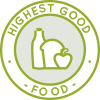 One Community is building a bridge between idealism and pragmatism through Highest Good food that is more diverse, more nutritious, locally grown and sustainable, and part of our open source botanical garden model to support and share bio-diversity:
One Community is building a bridge between idealism and pragmatism through Highest Good food that is more diverse, more nutritious, locally grown and sustainable, and part of our open source botanical garden model to support and share bio-diversity:
- Learn about the structures: Hoop House Hub | Aquapini & Walipini Open Source Hub
- See what we’ll be growing: Gardens & Hoop Houses | Large-scale Structures | Food Forest | TA
his week the core team continued working on the Herbal Garden design for behind the Duplicable City Center. We placed a gabion fence around the garden and trees, designed curved stone benches around the trees, strategically placed two storage benches next to the entry to the garden, and a spool table and seats in the center of the garden. You can see all of these new developments in the pictures below.
The original core team researcher did a round of review of the Rabbit Stewardship content developing on the website, adding edits for about ⦝’s of the doc, covering the reasons for raising rabbits, rabbit raising details, rabbit shelter needs, rabbit fencing needs, suggested vegetables and fruits for a rabbit diet, rabbit water needs, etc..
Jiayu Liang (Landscape Designer) completed her 21st week helping with the Aquapini & Walipini internal and external landscaping details. This week, Jiayu updated the new animations for Walipini 1 and Walipini 2 with additional plant, people, and structure details. Pictures below show some of her changes.
Mayur Rajput (Mechanical Engineer) also completed his 5th week working on the Aquapini/Walipini structures. He determined the remaining variables of the heat transfer equations and checked the results. The results seem promising and he moved forward with checking the performance of the system for the different types of soils. The system looks most promising with sandy clay as the soil in the climate battery.
Mayur then checked how the burial depth affects the system performance, as the burial depth increased the system got more efficient. But he needs to check how feasible it is to increase the burial depth. For now, the burial depth is kept at 13 feet (3.9624 meters) and he’ll research more about how much it can be varied and what would be a practical value. Mayur then started looking for the materials which can be used for the climate battery and their costs. He will continue working on that as he moves forward. The pictures below represent his work on all of the above.
Itztli De La Torre (Executive Chef) joined the team and completed his 1st week working on the Transition Food Self-sufficiency Plan. This week he spent a good amount of time trying to wrap his head around the program and what’s going to be possible logistically while also meeting the nutritional goals. Itztli spent time looking for recipe ideas that he thinks will most easily adapt all of the requirements while being varied and mindful of waste. He also began a week’s worth of recipes on a new tab that is just for him to get my ideas down and more organized. Pictures below show some of this initial work.
HIGHEST GOOD EDUCATION PROGRESS – BUILDING A BRIDGE BETWEEN IDEALISM AND PRAGMATISM
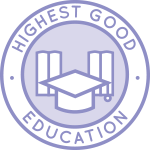 One Community is building a bridge between idealism and pragmatism through Highest Good education that is for all ages, applicable in any environment, adaptable to individual needs, far exceeds traditional education standards, and more fun for both the teachers and the students. This component of One Community is about 95% complete with only the Open Source School Licensing and Ultimate Classroom construction and assembly details remaining to be finished. We’ll report on the final two elements to be finished as we develop them.
One Community is building a bridge between idealism and pragmatism through Highest Good education that is for all ages, applicable in any environment, adaptable to individual needs, far exceeds traditional education standards, and more fun for both the teachers and the students. This component of One Community is about 95% complete with only the Open Source School Licensing and Ultimate Classroom construction and assembly details remaining to be finished. We’ll report on the final two elements to be finished as we develop them.
With over 8 years of work invested in the process, the sections below are all complete until we move onto the property and continue the development and open sourcing process with teachers and students – a development process that is built directly into the structure of the education program and everything else we’re creating too:
- Program Overview: Education Open Source Hub
- How the components work together: How to use the Education for Life Program
- Lesson Plans for Life – Lesson Plans How-to
- Foundations of Outstanding Leaders, Teachers, and Communicators
- Curriculum for Life
- Teaching Strategies for Life
- Learning Tools and Toys for Life
- Evaluation and Evolution
HIGHEST GOOD SOCIETY PROGRESS – BUILDING A BRIDGE BETWEEN IDEALISM AND PRAGMATISM
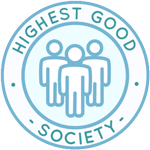 One Community is building a bridge between idealism and pragmatism through a Highest Good society approach to living that is founded on fulfilled living, the study of meeting human needs, Community, and making a difference in the world:
One Community is building a bridge between idealism and pragmatism through a Highest Good society approach to living that is founded on fulfilled living, the study of meeting human needs, Community, and making a difference in the world:
- Read the Highest Good society overview: Highest Good Society
- Learn about the model for fulfilled living and sharing: A Day in the Life
- Learn about the 4 economic models: RBE | For-profit | Non-profit | Entrepreneurship
- Learn about our open source community collaboration and management software: The Highest Good Network
This week the core team completed 28 hours managing One Community emails, social media accounts, interviewing potential new volunteer team members, and managing volunteer-work review and collaboration not mentioned elsewhere here.
The core team additionally completed our 10th week working on improving the content for all our Values Pages. This week we finished up editing the Fulfilled Living content. Specifically, we shortened paragraphs and sentences, and transformed passive voice, as well as proofread the final product before submitting for final review and then publishing the changes.
We also strengthened the body of the text, by adding additional text and expanding on the material that was already in place, updating the text that was linked to other pages and adding two new graphics. We then began reviewing the Community Contribution page.
Wen Zhang (Software Engineer) completed her 38th week as a volunteer working on the Highest Good Network software. This week Wen continued working on the function to upload a badge, which is now almost complete. Final steps, which she started on, are to create success/fail messages and add validation and error handling. Pictures below are related to this work.
Henry Nguyen (React Developer) completed his 47th week with the team and working on the Highest Good Network software. This week Henry added a new column to the imported Work Breakdown Structure and checked and clarified the specifics of the import process. Pictures related to this work are below.
TEKtalent Inc.(a custom programming solutions company) also continued with their 34th week helping with the Highest Good Network software. This week Nithesh and the TEK Talent team continued working on the changes as per the functional spec review in the user profile area. An end date was introduced in the API and front end which will now get updated on resetting a user (not paused) and the same will get displayed inside the user profile and the user management table. Pictures below show this work.
Noor Qureshi (Insurance Researcher) completed her 27th week helping research One Community’s insurance options. This week Noor worked on editing and reviewing her research, adding requested sections based on team feedback. She recounted the numbers for each plan as well as finished incorporating any additional information that was required. Then Noor began working on the projected costs portion of the project. Pictures below show some of this work.
Chris Weilacker (Software Engineer) completed his 22nd week working on the Highest Good Network software. This week, Chris added the ability for an Admin to view the dashboard as different users allowing the functionality to be passed down to the leaderboard timelog, badges, summary bar and task list. Chris also reviewed a couple of Pull Requests that were in waiting. You can see some pictures related to this below.
Jaime Arango (Graphic Designer) also completed his 21th week helping, returning to creating images for the One Community Updates Blogs like this one. He created intro images for youtube and the blog for weekly progress updates #435, #436, #437, #438 and #439. You can see all these new images below.
Robert Pioch (Graphic Designer) completed his 11th week helping with the new badges for the badges section on the Dashboard of the Highest Good Network. His focus this week was continued work on the Highest Good Education Badges. You can see pictures of the new designs and development process below.
Vy Dao (Software Developer) completed his 4th week working on the Highest Good Network software. This week, Vy continued work on reviewing, fixing, and updating multiple unit-testing files such as TimelogNavbar.test.js, TimeEntryForm.test.js, and also working on SummaryBar.test.js. Vy also researched to find a way to work around a few bugs that happen when developers try to change values in multiple fields. Pictures below show some of this work.
Yueru Zhao (Software Engineer) completed her 4th week working on the Highest Good Network software. This week Yueru made adjustments to the option table UI so the table is in the center of the page and the names are left aligned. Yueru also added the time frame dropdown button and the options of past week, past two weeks, past month, past 5 months, past year and custom range.
Then she added the blue square description to the person reporting page and added the team to the state which will hold all the team information like isActive, modifiedDatetime, id, teamName and createdDatetime. There are still some issues though with sending all this data to the state. Pictures below are related to this work.
AND WE PRODUCED THIS WEEKLY UPDATES BLOG – CLICK HERE TO SUBSCRIBE
FOLLOW ONE COMMUNITY’S PROGRESS (click icons for our pages)
INVESTOR PAGES
GET INVOLVED
DONATE | WAYS ANYONE CAN HELP | MEMBERSHIP
CLICK HERE FOR ALL PAST UPDATES
 One Community
One Community